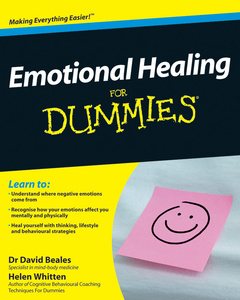Description
Emotional Healing For Dummies
Authors: Beales David, Whitten Helen
Language: English
Subject for Emotional Healing For Dummies:
384 p. · 18.8x23.6 cm · Paperback
Description
/li>Contents
/li>Readership
/li>Biography
/li>
- ?He should never have said that?
- ?How could she treat me this way??
- ?I feel guilty when I remember what I said to him?
- ?I?m so angry I can?t bear it?
Usually, we don?t feel that we can discuss these hurtful emotions, such as guilt, anger or jealousy, with our friends and families, let alone go to a GP for advice on dealing with them. We?re a nation that bottles things up, dismissing anger, frustration, hatred and guilt as largely insignificant to our minds and bodies. But powerful emotions like these do affect us in a long-term way, not only mentally but also physically, and it?s important to know how to get them under control before our health really suffers.
This easy-to-follow, plain-English guide shows you why and how emotions can leave a physical scar, and talks about various life factors and influences that can lead to emotional stress. It will help you heal your emotional traumas with a toolkit of strategies, and allows you to take care of your health with a practical, hands-on approach.
Emotional Healing For Dummies covers:
PART 1: INTRODUCING EMOTIONAL HEALING
Chapter 1: Understanding Emotional Healing
Chapter 2: Exploring the Physiology of Emotion
Chapter 3: Tuning into Emotions
PART 2: EMOTIONS AND YOUR BODY
Chapter 4: You are What you Eat
Chapter 5: Body Rhythms
Chapter 6: Physical Strategies for Emotional Healing
PART 3: EMOTIONAL HEALING FOR REAL LIFE
Chapter 7: Mapping the Emotional Environment
Chapter 8: Facing up to Emotional Challenges
Chapter 9: Managing Relationships
Chapter 10: Strategies for Getting through Tough Times
Chapter 11: Life?s Transitions
PART 4: THE EMOTIONAL HEALING TOOLKIT
Chapter 12: Thinking Strategies for Emotional Healing
Chapter 13: Mindfulness Practices to Rebalance
Chapter 14: Lifestyle Strategies for Emotional Healing
Chapter 15: Becoming the Emotionally Healed Person
PART 5: TAKING YOUR HEALING TO ANOTHER LEVEL
Chapter 16: Planning to Manage Emotions in the Future
Chapter 17: Inspiring Healing in Others
Chapter 18: Helping your Child to Heal
PART 6: THE PART OF TENS
Chapter 19: Ten Ways to Heal Emotional Wounds
Chapter 20 Ten Ways to Stay Positive
Chapter 21: Ten Exercises for Emotional Healing
Part I: Introducing Emotional Healing.
Chapter 1: Understanding Emotional Healing.
Chapter 2: Exploring the Physiology of Emotion.
Chapter 3: Tuning In to Your Emotions.
Part II: Emotions and Your Body.
Chapter 4: Unravelling Feelings and Food: What’s Eating You?
Chapter 5: Tackling Tiredness: Following Your Body Rhythms.
Chapter 6: Actively Engaging in Your Emotional Healing.
Part III: Emotional Healing for Real Life.
Chapter 7: Putting Your Emotions in Context.
Chapter 8: Facing Up to Emotional Challenges.
Chapter 9: Managing Relationships.
Chapter 10: Getting Through Tough Times.
Chapter 11: Coping with Life’s Transitions.
Part IV: The Emotional Healing Toolkit.
Chapter 12: Managing Feelings with Thinking Strategies.
Chapter 13: Finding Insight through Mindfulness.
Chapter 14: Using Day-to-Day Strategies for Emotional Healing.
Chapter 15: Living as an Emotionally Healed Person.
Part V: Taking Your Healing to New Levels.
Chapter 16: Planning Ahead: Handling Diffi cult Emotions in the Future.
Chapter 17: Inspiring Healing in Others.
Chapter 18: Helping Your Child Heal.
Part VI: The Part of Tens.
Chapter 19: Ten Ways to Heal Emotional Wounds.
Chapter 20: Ten Ways to Stay Positive.
Chapter 21: Ten Activities for Emotional Healing.
Appendix: Useful Contacts and Resources.
Index.
- Individuals interested in self–help
- Individuals interested in drug–free approaches to improving their well–being and emotional health
- Individuals with existing health problems, which haven′t decreased by using medicine
Secondary market
- Counsellors, coaches, and mentors supporting people of all ages
Helen Whitten is an accredited coach and mediator specialising in cognitive behavioural coaching and neuro-linguistic programming. She is Managing Director of Positiveworks, a coaching consultancy that helps people make the best of their lives.




